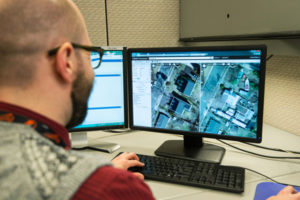
A neighbor to the nation’s capital, Fairfax County, Virginia, is made up of 407 square miles and a population of 1.12 million people. Highly developed from the 1960s through the 1980s the county has 352,910 taxable parcels and relatively little undeveloped land available. When change happens, it’s often going to be property rebuilding or remodeling.
The Real Estate Division, Fairfax County,
Department of Tax Administration has the challenge of managing those nearly 353,000 parcels with a staff of fewer than 100. To help them overcome this challenge, while maintaining productivity and staying on top of the changes happening in their jurisdiction, the county turned to
CONNECTAssessment™ and
ChangeFinder™ to help.
No stranger to EagleView
®, formerly known as Pictometry
®, Fairfax County has been having their jurisdiction flown since 2003. The residential appraisers would access the imagery and tools through EagleView’s Electronic Field Study (EFS), a self-hosting solution that required an onsite server and installations of software on each computer. With 52 residential appraisers and 24 commercial appraisers, using EFS resulted in a lot of computers with software to maintain.
Technology to manage change
Assistant Director for Residential Properties, Larry Mackereth, CAE, said one of the reasons that they decided to be the first county in the U.S. to implement CONNECTAssessment is because it is accessed via the web. “The first advantage for us in using CONNECTAssessment is that is doesn’t require extensive installation on each machine. When you have a staff our size, that’s a pretty big advantage,” explained Mackereth. “Second is that we have a fairly large number of staff that telework and having a web-based product is effective since it can be used from many locations.”
Implementation of CONNECTAssessment began in spring 2014 and the first training for the appraisers was held shortly after. ChangeFinder deliverables were added and appraisers began reviewing the properties in late June. “In reviewing our deliverables we found that about 8% of our candidates have some sort of change – this represents about 20,000 of our properties,” said Mackereth. “In order to manage this we had to focus our efforts on major changes, for example new construction and demolitions.”
It was important for Fairfax County to begin the project well in advance of its annual review that begins in September. “Because it was a new system, we anticipated experiencing a few delays so we tried to set a realistic goal to review 50 percent of the change candidates by October 1,” explained Mackereth. “Our review focused on new construction, demolished properties and those with a change greater than 25 percent. By mid-September, we exceeded that goal by 20 percent and by the time we began our yearly assessment review we had reviewed about 73 percent of the properties.”
Doing more with fewer resources
Mackereth is pleased with the efficiencies that CONNECTAssessment and the ChangeFinder deliverables have provided his team. The department previously had a neighborhood walk program where appraisers and data collectors inspected properties door to door, one house at a time, with the objective of the program being to inspect one-sixth of the residential properties in the county annually; however due to budgetary constraints the program was cut. “We spend a lot of time in the field collecting data, monitoring demolitions and new construction; however because of our staffing limitation we can’t be on top of every property. ChangeFinder and CONNECTAssessment allow us to continue to inspect a large portion of our jurisdiction in a cost-effective manner without necessarily having to go to the field.”
Residential appraiser Teresa Rhinehart was one of the first in the department to use CONNECTAssessment and uses it every day. “It’s quicker, faster and it’s even easier to access imagery from prior years, which helps with verifications,” explained Rhinehart. Fellow appraiser Forrest Mathews agrees that the interface is easy to use and he uses it on a daily basis. “I really like the online access and it is much easier to view previous years’ images,” said Mathews. “I like to use it to prepare for field work.”
Improving access and saving time
Appraisers doing field work are sometimes stymied due to lack of access to properties. Mackereth said that CONNECTAssessment has helped his team overcome this issue. “In the field the appraisers have to be granted permission to access the backyards of properties,” explained Mackereth. “This can be time consuming and difficult to obtain, especially when dealing with gated communities.”
Mackereth has said that using CONNECTAssessment with the ChangeFinder deliverables saves the appraisers’ time by allowing them to quickly identify changes to the property and in many cases make the required updates to the property record without a field inspection. He said it also provides an opportunity for additional quality control. “Some of our change candidates had existing permits that the appraiser was aware of but by doing a quick review in CONNECTAssessment, it allowed another chance for the appraiser to ensure the record was correct,” stated Mackereth.
While Fairfax County is fully developed, Mackereth said he sees advantages for other jurisdictions. “I could see how this application would be very useful for counties with lots of new development.” Overall he is very pleased with the department’s choice to implement the program. He says that in addition to the obvious benefit provided by the change detection technology, the additional benefits of having access to properties that are typically inaccessible and being able to meet the requirements for the number of inspections required annually has been a win for his team.
“It helps us do our job more efficiently because now we can check properties without leaving the desk. What used to take hours now only takes minutes,” concluded Mackereth.